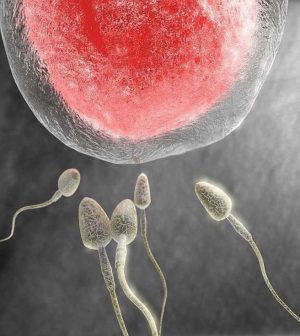- 7 Best Breads for Maintaining Stable Blood Sugar
- Gelatin vs. Collagen: Which is Best for Skin, Nails, and Joints?
- The Long-Term Effects of Daily Turmeric Supplements on Liver Health
- Could Your Grocery Store Meat Be Causing Recurring UTIs?
- Are You Making This Expensive Thermostat Error This Winter?
- Recognizing the Signs of Hypothyroidism
- 10 Strategies to Overcome Insomnia
- Could Artificial Sweeteners Be Aging the Brain Faster?
- Techniques for Soothing Your Nervous System
- Does the Water in Your House Smell Funny? Here’s Why
Genes ‘Switched On’ Much Earlier in Human Embryos Than Thought

Genes in human embryos become active far sooner than once thought, according to a study that provides fresh insight into development.
Contrary to the old view that gene activity begins two to three days after conception when the embryo is made up of four to eight cells, researchers found that it actually begins at the one-cell stage.
One-cell embryos have hundreds of active genes, but previous techniques have not been sensitive enough to detect that small amount of activity. State-of-the art RNA-sequencing used in this study could do so, according to the British authors.
“This is the first good look at the beginning of a biological process that we all go through — the transit through the one-cell embryo stage,” said study co-leader Anthony Perry, a professor of biology and biochemistry at the University of Bath.
One-cell embryos without gene activity don’t continue to develop, so gene activity is “a fundamental step,” Perry noted in a university news release.
His team also found that many genes activated in one-cell embryos remain switched on until the four-to-eight cell stage. At that point, they are switched off.
“It looks as if there is a sort of genetic shift-work in early embryos: The first shift starts soon after fertilization, in one-cell embryos, and a second shift takes over at the eight-cell stage,” Perry said.
Some of the activated genes in one-cell embryos might be expected to play roles in early embryos, but the roles of other activated genes are unknown and could point to embryonic events not yet understood, according to the findings. The study was published Dec. 21 in the journal Cell Stem Cell.
“Although the trigger for activation is thought to come from the egg, it’s not known how,” Perry said. “Now we know which genes are involved, we can locate their addresses and use molecular techniques to find out.”
The natural, healthy role of some gene-activation factors that go awry and cause cancer may be to awaken genes in one-cell embryos, researchers suggested. If that proves true, the study could boost understanding of how cancer begins and lead to new ways to prevent and diagnose it.
The study may also provide new insight into inherited traits, such as obesity. It’s not known how such traits are passed from parents to children, but altered gene activation after fertilization is a possible mechanism, according to the researchers.
“If true, we should be able to see this altered gene activation signature at the one-cell stage,” said study co-leader Giles Yeo, principal research associate at the University of Cambridge.
More information
The U.S. Office on Women’s Health outlines the stages of pregnancy.
SOURCE: University of Bath, news release, Dec. 21, 2021
Source: HealthDay
Copyright © 2026 HealthDay. All rights reserved.










